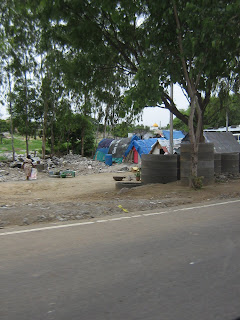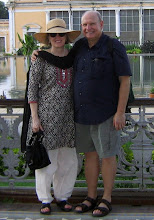 Over the past 25 years I have had the opportunity to visit a number of cities on every continent. The morning we arrived in Hyderabad, it was, in the classical noir genre term, “a dark and stormy night”. During the drive to the hotel, very little of the landscape was discernible, but I immediately recognized some of the characteristics I had seen in other cities. There was the haphazard architecture of existing neighborhood shops. There was evidence of demolition and rubble at each bend in the road. And then there were vehicles of all shapes and sizes in various states of repair that loomed in the shadowy edges of the headlight beams of our car a
Over the past 25 years I have had the opportunity to visit a number of cities on every continent. The morning we arrived in Hyderabad, it was, in the classical noir genre term, “a dark and stormy night”. During the drive to the hotel, very little of the landscape was discernible, but I immediately recognized some of the characteristics I had seen in other cities. There was the haphazard architecture of existing neighborhood shops. There was evidence of demolition and rubble at each bend in the road. And then there were vehicles of all shapes and sizes in various states of repair that loomed in the shadowy edges of the headlight beams of our car a s we wound our way over the irregular surfaces of the streets toward the hotel.
s we wound our way over the irregular surfaces of the streets toward the hotel.It wasn’t until Wednesday when Deb went to the office that the landscape fully presented itself. It was a moving sea of people, vehicles, and animals. But unlike the staged shots you get in National Geographic by very skilled photographers, you get the contextual view of that dichotomy of urban vitality spurred on by the economic growth in direct proximity to the abject poverty which is attracted to it and lives on any piece of space not occupied by something else. I could sense some apprehension in Deb as we rode to the office. But the sounds and motion of the traffic that surrounds you keeps some of the focus off the squatters’ tent cities in the open spaces that come right up to the edge of the road. The occupants literally have to watch for traffic as the crawl out of their makeshift abodes. But what always fascinate me are the entrepreneurs who serve these communities. We don’t often see this in the US because our poor are (1) not poor by world standards, and (2) they are bifurcated into urban and rural pockets that we generally don’t visit – ever. Did you ever think about why the Southland Corporation is a quiet success story? Well, that’s another story, but vendors purposefully come to serve these communities. Most of their stores are as rustic as the homes of their customers. They poach electricity if they can so that a string of discarded lights becomes a beacon for the customers who may be coming home with a few rupees he or she earned that day.




No comments:
Post a Comment